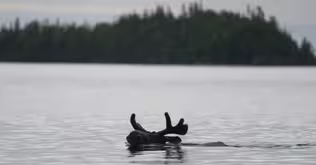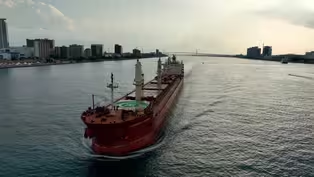
The Catch
Clip: Season 3 Episode 10 | 2m 57sVideo has Closed Captions
The Catch is GLN’s one stop shop for bite-sized news and events about the lakes you love.
Keep up with the news, issues and events happening around the Great Lakes. Learn about Minnesota swimmers taking a stand on climate change, environmental DNA research happening in Lake Huron, and an excerpt from our new environmental justice series, “Waves of Change,” featuring herbalist and forager Monica Cady.
Problems playing video? | Closed Captioning Feedback
Problems playing video? | Closed Captioning Feedback
Great Lakes Now is a local public television program presented by Detroit PBS

The Catch
Clip: Season 3 Episode 10 | 2m 57sVideo has Closed Captions
Keep up with the news, issues and events happening around the Great Lakes. Learn about Minnesota swimmers taking a stand on climate change, environmental DNA research happening in Lake Huron, and an excerpt from our new environmental justice series, “Waves of Change,” featuring herbalist and forager Monica Cady.
Problems playing video? | Closed Captioning Feedback
How to Watch Great Lakes Now
Great Lakes Now is available to stream on pbs.org and the free PBS App, available on iPhone, Apple TV, Android TV, Android smartphones, Amazon Fire TV, Amazon Fire Tablet, Roku, Samsung Smart TV, and Vizio.
Providing Support for PBS.org
Learn Moreabout PBS online sponsorshipIn the waters of Lake Superior, just north of Duluth, Minnesota, a group of six swimmers participated in a relay covering 48 miles, and they did it without wetsuits.
Minnesota Public Radio's Dan Kraker reported on the story.
- They really said it was an amazing experience, but also a little disconcerting because the big part of the reason why they did this swim was to raise awareness about just how fast the water temperatures are rising in Lake Superior.
20, 50 years ago, it would've been a lot tougher to find a day when the weather would've accommodated a swim like this.
- Since 1998, the water temperature of Lake Superior has risen by five degrees.
That makes Lake Superior the fastest warming lake on planet Earth.
- It only takes a couple degrees of warmer surface air temperature in the winter to really have a big impact on less ice cover.
So let's say it's four or five degrees warmer in the winter that can result in a really sharp reduction in ice cover which in turn can really lead to markedly warmer water temperature in the summer.
- Those warming waters can and will have an impact on the Great Lakes ecosystem.
- You know, Lake Superior is famously cold and clear but over the last decade or so, there have been several instances where toxic algae blooms have been cited on the south shore of Lake Superior.
That's really been associated with these warmer surface water temperatures that we've seen that obviously can have human health impacts.
A lot of the fish in Lake Superior obviously adapted to cold water.
Lake Herring is one and there have been studies that have shown that as the water has warmed and especially as ice cover has decreased, that has had impacts on the reproduction rates of Lake Herring.
- As years go by and water temperatures continue to rise we can expect more changes to come.
- Trends clearly indicate that water is gonna continue to get warmer in Lake Superior but I do wanna stress that just because in general the water is getting warmer, swims like this without wetsuits are gonna be more and more feasible.
That doesn't mean there aren't gonna still be very cold days in the lake and very cold years in the lake when you know there's a lot of ice cover in the winter and subsequently colder water in the summer.
There's also a phenomenon called upwelling where the warm surface water gets pushed out by winds and the cold water underneath comes up to the top.
So that's these days where suddenly the light can shift from being in the sixties to being in the forties.
And those are days you don't wanna be swimming without a wetsuit.
I think events like this can really raise awareness about how quickly things are changing, how just the impact that humans are having on these fragile ecosystems and the real impacts that they can have on fish, on the water quality, and those things that are really important to folks who live around the Great Lakes.
Video has Closed Captions
Clip: S3 Ep10 | 9m 40s | Visit a remote island where wolves and moose have been studied for more than 60 years. (9m 40s)
Video has Closed Captions
Clip: S3 Ep10 | 8m 1s | Freighter pilots are helping to keep Great Lakes waterways, and other boaters, safe. (8m 1s)
Providing Support for PBS.org
Learn Moreabout PBS online sponsorship
- Science and Nature

Explore scientific discoveries on television's most acclaimed science documentary series.

- Science and Nature

Capturing the splendor of the natural world, from the African plains to the Antarctic ice.












Support for PBS provided by:
Great Lakes Now is a local public television program presented by Detroit PBS

